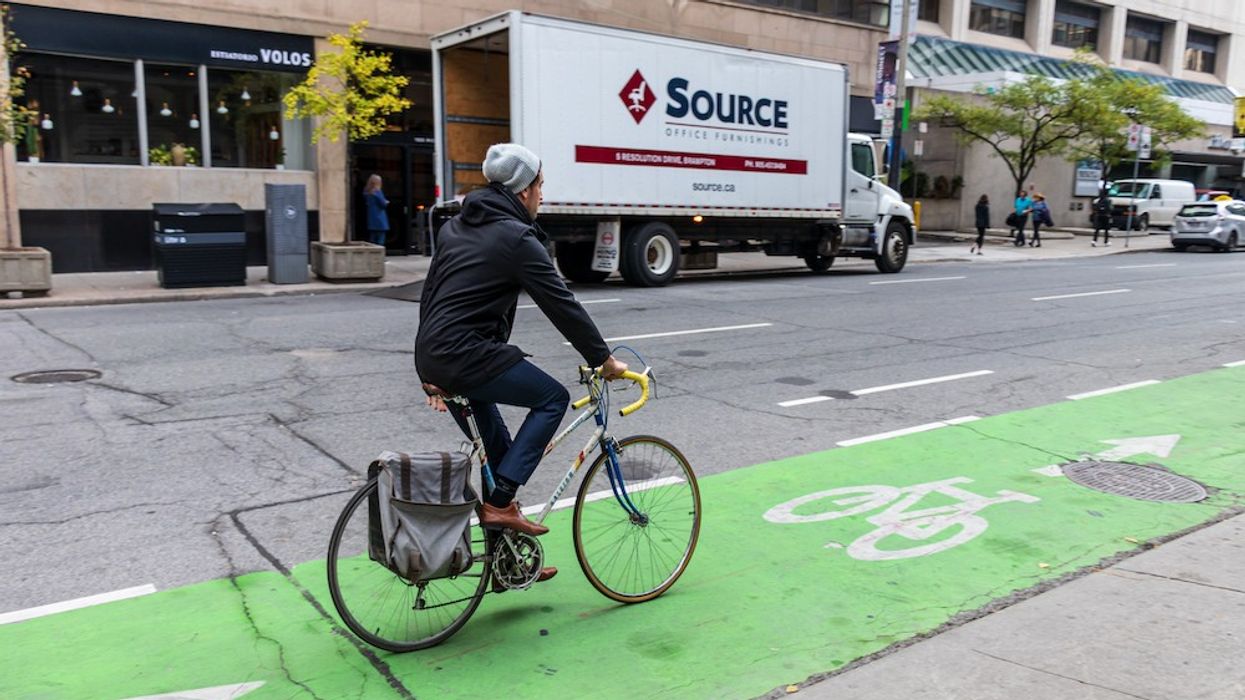If Toronto moved any slower, it would be going backwards. Perhaps that’s why it often seems the city -- if not the country -- is advancing in reverse. Whether it’s major infrastructure projects or simple road repairs, getting anything done in Toronto has never seemed so slow and difficult. Politically and bureaucratically, the city can no longer keep up with demand, let alone respond nimbly and quickly. The ball was dropped years ago.
The latest reminder came on September 14 when Councillor Buxton Potts announced by Twitter that the city had just told her it would need nine months to replace a bike lane removed weeks earlier during sidewalk repairs near Corktown Common. Nine months! That’s the time it takes for a human baby to come to full term.
Then, of course, there are the potholes that regularly turn even the sleepiest residential streets into noisy tire-shredding obstacle courses. Given the extremes of Toronto’s climate, potholes are a fact of life here. In 2018, the city filled 244,426 potholes. But by 2021, that had dropped to 120,420.
Then, last August, civic officials announced that road repairs planned for 2022 would be delayed until some time next year. Though the work had been tendered, the process was abruptly stopped, reportedly to provide clearer instructions to prospective bidders. Predictably, engineers warned that postponement would cost more in the long run. Coincidentally, when that bill finally comes due, the upcoming October 24 civic election will be history.
So it’s no surprise that the city’s SOGR (State of Good Repair) backlog is expected to hit $7.4B this year. In addition, the value of approved-but-unfunded capital projects in Toronto now tops $42B.
And let’s not get started on transit: Toronto -- and Ontario’s -- record is abysmal. Consider the sorry saga of the Eglinton Crosstown: construction began way back in 1994 under Premier Bob Rae. Remember him? A year later, Rae’s successor, Mike Harris, cancelled it. Filling that pothole cost us $40M. In 2007, the line was revived in Mayor David Miller’s Transit City plan, only to be killed once again by his successor, Rob Ford, in 2010. That same year it was restarted, albeit in altered form. Today it’s still under construction. Although originally scheduled to open in 2020, that was delayed until this September. Unsurprisingly, that deadline has come and gone. By the time the new line finally goes into operation, it will have been three decades in the works.
READ: Tory Makes Election Transit Pledge with “Laser Focus” on Existing $28B Plan
By contrast, the Chinese make us look like sluggards. At the start of the 2000s, there were no high-speed rail lines in China; today there are almost 40,000 km of track across the country, all of it built since 2008. Then there was that 1,000-bed Covid-19 hospital the Chinese built in 10 days, a tiny fraction of the time required to paint a bike lane in Toronto.
Unlike China, Canada is not a one-party, top-down state. Yet even this country’s diluted democracy means decision-making is a messy business. Whether we’re talking about federal, provincial or municipal politics, the story is one of obfuscation, hesitation and procrastination. Never do today what you can put off till tomorrow.
Underlying everything, of course, is the fear of spending money. In Canada tax is a four-letter word. For most political leaders -- from John Tory and Mel Lastman to Doug Ford and Pierre Poilievre -- keeping taxes low is the first and last priority.
Other than going to Queen’s Park or Ottawa cap in hand, it is impossible for Toronto to raise the money it needs without raising property taxes. Sometimes that can’t be avoided, usually it can. Regardless, it’s clear more sustainable fiscal measures are desperately needed.
More disturbing, however, is the lack of urgency pervasive in municipal political culture. Our willingness to settle for same old, same old leads to an acceptance of mediocrity that over decades has come to seem normal. Peopled largely by electoral lifers, city council generally supports the narrow NIMBY interests of homeowners and drivers. As a long-retired councillor once declared, the biggest two issues in civic politics are dog poop and parking.
For a city as content with the status quo as Toronto, the future, with its promise of change, threatens everything residents hold dear. And so it is that a city that has declared a climate emergency will spend $4.5B to maintain and rebuild an out-dated but familiar elevated expressway. That, combined with deep-seated tax aversion, adds up to policy of official procrastination and doing as little as possible.
After all, good enough is good enough.





















